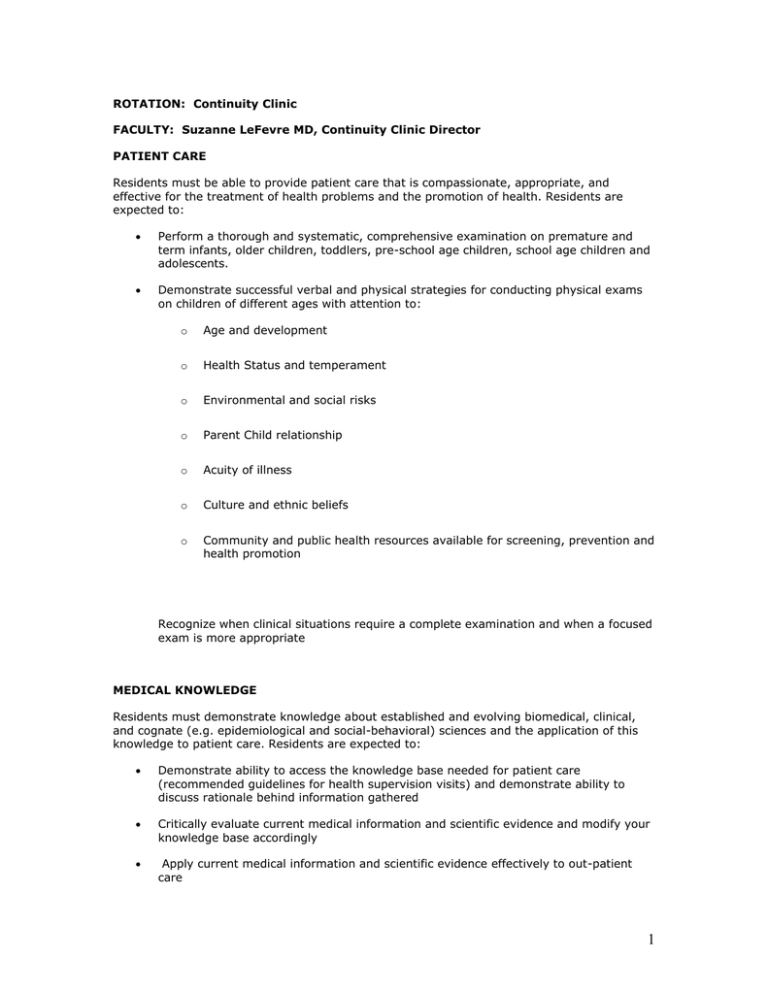ROTATION: Continuity Clinic PATIENT CARE
advertisement

ROTATION: Continuity Clinic FACULTY: Suzanne LeFevre MD, Continuity Clinic Director PATIENT CARE Residents must be able to provide patient care that is compassionate, appropriate, and effective for the treatment of health problems and the promotion of health. Residents are expected to: Perform a thorough and systematic, comprehensive examination on premature and term infants, older children, toddlers, pre-school age children, school age children and adolescents. Demonstrate successful verbal and physical strategies for conducting physical exams on children of different ages with attention to: o Age and development o Health Status and temperament o Environmental and social risks o Parent Child relationship o Acuity of illness o Culture and ethnic beliefs o Community and public health resources available for screening, prevention and health promotion Recognize when clinical situations require a complete examination and when a focused exam is more appropriate MEDICAL KNOWLEDGE Residents must demonstrate knowledge about established and evolving biomedical, clinical, and cognate (e.g. epidemiological and social-behavioral) sciences and the application of this knowledge to patient care. Residents are expected to: Demonstrate ability to access the knowledge base needed for patient care (recommended guidelines for health supervision visits) and demonstrate ability to discuss rationale behind information gathered Critically evaluate current medical information and scientific evidence and modify your knowledge base accordingly Apply current medical information and scientific evidence effectively to out-patient care 1 PRACTICE-BASED LEARNING AND IMPROVEMENT Residents must be able to investigate and evaluate their patient care practices, appraise and assimilate scientific evidence, and improve their patient care practices. Residents are expected to: Seek knowledge, skills and attitudes needed for life-long learning and self assessment and recognize key issues about continuing education and recertification processes for pediatricians Demonstrate ability to use quality improvement methods to monitor and improve health care that one provides to children Identify the risks to health and barriers to care for underserved children in the community, and demonstrate skill in improving their access to continuous comprehensive health maintenance Work with health care team members to assess, coordinate, and improve patient care in the outpatient setting INTERPERSONAL AND COMMUNICATION SKILLS Residents must be able to demonstrate interpersonal and communication skills that result in effective information exchange and teaming with patients, their patients families, and professional associates. Residents are expected to: Demonstrate ability to provide effective patient education, including reassurance, for conditions common to the outpatient setting via verbal, written, visual and/or hands on techniques Strive to conduct effective interviews with parents and children: o assess and respond to the family’s learning style o Adapt language and concepts to the educational level of the family o Identify cultural, ethnic and socioeconomic issues during the interview o Identify and deal with language barriers o Identify any hearing, speech or vision impairments and take these into account during exam Strive to communicate with physicians, other health professionals and health related agencies to create and sustain information exchange and team work for patient care Maintain accurate, legible, timely, and legally appropriate medical records in the clinical setting PROFESSIONALISM 2 Residents must demonstrate a commitment to carrying out professional responsibilities, adherence to ethical principles, and sensitivity to a diverse patient population. Residents are expected to: Demonstrate personal accountability to the well being of patients (e.g., following up lab results, writing comprehensive notes, and seeking answers to patient care questions) Demonstrate a commitment to professional behavior in interactions with staff and professional colleagues Adhere to ethical and legal principles, and be sensitive to diversity SYSTEMS-BASED PRACTICE Residents must demonstrate an awareness of and responsiveness to the larger context and system of health care and the ability to effectively call on system resources to provide care that is of optimal value. Residents are expected to: Identify key aspects of health care systems (e.g., public and private insurance) as they apply to the primary care provider, such as the role of the PCP in decision-making, referral, and coordination of care Demonstrate sensitivity to the costs of clinical care in the outpatient setting, and take steps to minimize costs without compromising quality Identify and advocate for families who need assistance to deal with systems complexities, such as lack of insurance, multiple medication refills, multiple appointments with long transport times, or inconvenient hours of service Recognize one’s limits and those of the system and take care to avoid medical errors Goals and Objectives are pertinent to all levels of training. Interns are expected to acquire knowledge and demonstrate understanding of all continuity clinic goals and objectives during first year of training. Second and third year residents are expected to demonstrate mastery of all goals and objectives and third year residents are expected to be able to teach broad competencies to interns and medical students. 3




